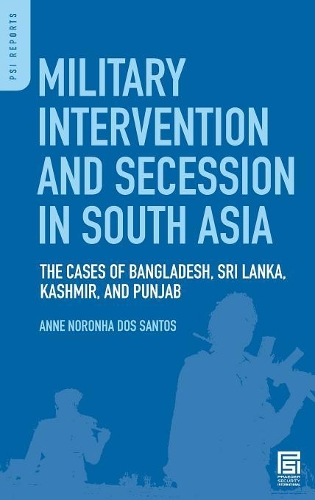
Military Intervention and Secession in South Asia: The Cases of Bangladesh, Sri Lanka, Kashmir, and Punjab
(Hardback)
Publishing Details
Military Intervention and Secession in South Asia: The Cases of Bangladesh, Sri Lanka, Kashmir, and Punjab
By (Author) Anne N. Dos Santos
Bloomsbury Publishing PLC
Praeger Publishers Inc
30th October 2007
United States
Classifications
Tertiary Education
Non Fiction
Military history
Armed conflict
International relations
954
Physical Properties
Hardback
216
Width 156mm, Height 235mm
482g
Description
From Chechnya in Russia to Kashmir in India to the Basque region in Spain, secessionist movements remain a serious threat to international security. Despite the importance of this issue, the causes that bring about external military intervention in a secessionist war have not, until now, been adequately addressed. In this book, Dos Santos identifies the conditions that make international military intervention in a secessionist war more or less likely. South Asia, being fraught with secessionist movementsBangladesh, Sri Lanka, Kashmir, and Punjabprovides an ideal laboratory for the examination of this compelling issue. Dos Santos argues that a shift in the balance of power between a secessionist group and its central government will lead to a preventive war on the secessionists by the central government. In turn, a preventive war of this nature may lead to an alliance between the secessionist group and an external power. The stronger the alliance, the greater the chances of an international military intervention. Understanding the conditions under which secessionist movements expand, become secessionist wars, and invite international military intervention on behalf of the secessionists has strong policy implications. It can go a long way toward guiding policymakers who may want to mitigate or avoid these conditions in their states. Dos Santos views both states and secessionist groups as primary actors, and she examines both the distribution of power among states and the balance of power between central government and groups within states.
Reviews
The author draws on some of the most advanced theories in international relations to develop a theory based on the relative power of various secessionist groups and their balance of power within a given state.This is a timely and well-thought presentation that advances the reader's understanding of the causes and consequences of violent state disintergration. * Parameters *
Santos (political science, California State U., Fullerton) develops a conceptual framework that identifies the conditions that make international military intervention more or less likely. She uses the framework to determine the range of possible outcomes of secessionist movements, including success, failure and stalemate, and then tests her theory against events in Bangladesh, Sri Lanka, Kashmir, and Punjab. The result is far more than a simple balancing of adherent and troop sizes but a careful examination of the complex elements that make up a secessionist movement, including the reasons for its inception, the aims of the movement in comparison to social and economic stability, the incidence of violence, and the nature of each sides' propaganda. * SciTech Book News *
Author Bio
Anne Noronha Dos Santos is a lecturer in Political Science at California State University, Fullerton. She holds a Ph.D. in Political Science, with a major in International Relations, from the University of California, Riverside.
